- Home
- Vicki Delany
Among the Departed
Among the Departed Read online
Among the Departed
A Constable Molly Smith Novel
Vicki Delany
www.vickidelany.com
Poisoned Pen Press
Copyright © 2011 by Vicki Delany
First Edition 2011
ISBN: 9781615952687 ebook
All rights reserved. No part of this publication may be reproduced, stored in, or introduced into a retrieval system, or transmitted in any form, or by any means (electronic, mechanical, photocopying, recording, or otherwise) without the prior written permission of both the copyright owner and the publisher of this book.
The historical characters and events portrayed in this book are inventions of the author or used fictitiously.
Poisoned Pen Press6962 E. First Ave., Ste. 103Scottsdale, AZ 85251
www.poisonedpenpress.com
[email protected]
Contents
Contents
Contents
Dedication
Acknowledgments
Prologue
Chapter One
Chapter Two
Chapter Three
Chapter Four
Chapter Five
Chapter Six
Chapter Seven
Chapter Eight
Chapter Nine
Chapter Ten
Chapter Eleven
Chapter Twelve
Chapter Thirteen
Chapter Fourteen
Chapter Fifteen
Chapter Sixteen
Chapter Seventeen
Chapter Eighteen
Chapter Nineteen
Chapter Twenty
Chapter Twenty-one
Chapter Twenty-two
Chapter Twenty-three
Chapter Twenty-four
Chapter Twenty-five
Chapter Twenty-six
Chapter Twenty-seven
Chapter Twenty-eight
Chapter Twenty-nine
Chapter Thirty
Chapter Thirty-one
Chapter Thirty-two
Chapter Thirty-three
Chapter Thirty-four
Chapter Thirty-five
Chapter Thirty-six
Chapter Thirty-seven
Chapter Thirty-eight
Chapter Thirty-nine
Chapter Forty
Chapter Forty-one
Chapter Forty-two
Chapter Forty-three
Chapter Forty-four
More from this Author
Contact Us
Dedication
To Alex, Julia, and Caroline
Acknowledgments
As always I am extremely grateful for the help and support I get from police officers in Ontario and British Columbia. In particular I’d like to thank Staff Sergeant Kris Patterson, Sergeant Rene Menard, Sergeant Brad Gilbert, Constable Paul Burkart, Corporal Al Grant, Constable Nicole Lott, Constable Kyle King. Thanks to Constable Dan Joly who told me about living and working with police dogs, and to Diablo who demonstrated.
I try as hard as I can to get the policing right, but sometimes the story has to take precedence over the facts, so any and all procedural errors are strictly mine.
Thanks to my fabulous critique group: Dorothy McIntosh, Cheryl Freedman, Donna Carrick, Madeleine Harris-Callway and Jane Burfield, who read as fast as I can write.
Also to Carol Reynolds for details about artists and art galleries. When next you are in Nelson be sure to look up Carol and her art.
And to Tony and Herb for lending me their names.
Prologue
“I hate you.”
“That’s too bad because I love you, but you still have to take a timeout.”
“No!”
“Jamie, go into the tent and stay there until you’re told you can come out.”
“No.”
“I’m going to count to three and if you are not in that tent, you won’t be allowed out for hot chocolate. One…”
Jamie wanted to stick out his tongue but he didn’t dare. That really made his mum mad.
Poppy pulled a face at him from behind their mother’s back.
Poppy could stick out her tongue. Poppy could do whatever she wanted. It was her stupid fault he was in trouble. It was always her fault.
“Two…”
Jamie turned and stomped across the campsite to the tent, stamping his feet as loudly as he could. He stretched as he entered, but still didn’t quite brush the top of the door.
Stupid tent. Stupid camping. Stupid Canada.
He wanted to go home.
He gave his sleeping bag a good satisfying kick before throwing himself onto it.
He wanted to cry, but at five years old Jamie Paulson was too old to cry.
This was supposed to be an adventure. Dad had said they’d see grizzly bears and hear wolves and catch fish and cook over a fire and live like Indians.
Yesterday they saw a squirrel.
He heard a wolf last night, after he and Poppy went to bed, when Mum and Dad were sitting around the fire, but Poppy said it was Dad trying to be scary.
Stupid girls. Ruin everything.
Fishing was boring. Dad stood on the side of the river and threw a line in and pulled it out again. So far he hadn’t even had a bite, never mind catching enough fish to feed the whole family. And take some back to Granny, which is what he’d said he’d do.
When Jamie had thrown a stone into the water, Dad got mad and said he was scaring the fish away.
“Fishing is stupid.”
“It’s not the fish, Jamie,” Dad said with that sigh that meant he was not happy, “It’s the fishing. Peace, quiet, relaxation.”
Peace and quiet were stupid. Jamie stared at the roof of the tent. He didn’t know why adults wanted peace and quiet anyway. Dad wouldn’t let them bring their new DVD player on the camping trip, and Poppy got in a snit when ordered to leave her iPod behind.
They were in Canada for a whole month, them and Granny, visiting Aunt Maureen and Uncle Henry. Jamie expected it would be more fun than this. He’d bragged to all his mates back home that they were going to be having adventures in Canada, riding horses and climbing mountains and staying in really big houses. Instead Aunt Maureen and Uncle Harvey lived in a middle unit of a townhouse row in Abbotsford, a home even smaller than Jamie’s family’s new bungalow in London.
He grudgingly had to admit that the mountains, some with snow still on the tops even though it was late summer, were pretty neat, and the Vancouver aquarium was brilliant, and so were the totem poles at the museum. He’d asked why no one was looking after the totem poles, just letting them rot and fall down. The museum guide said the Haida (Jamie said the word out loud, to hear it on his tongue) believed totems should have a natural life, like people and animals. Jamie liked that. His dog Rusty died before they came on this stupid trip, and Dad had told him death was part of life.
If Rusty had been here, this would have been a great vacation.
Dad asked Poppy to come down to the lake with him and get water to boil for coffee and hot chocolate. Poppy huffed and puffed, but Jamie heard branches break as she got up off her fat arse and followed him.
He smelled smoke and heard the pop and hiss of the campfire.
Mum wasn’t a very good cook, nowhere near as good as his friend’s Michael’s mum who’d worked in a restaurant before she got married, but Jamie had to admit the food was p
retty good cooked over a fire. They ate Canadian food like hot dogs and hamburgers, and before going to bed they drank hot chocolate and toasted marshmallows on sticks over the fire. He liked to let his marshmallow catch fire, and watch the flames leaping into the darkening sky. He couldn’t eat them like that, burned black, and Mum said he was wasting food, but he still did it.
They had not caught and eaten any fish.
They had not seen grizzly bears or wolves.
Jamie pushed the sleeping bag aside and sat up.
If Dad didn’t spend all his time trying to catch a fish, and Mum wasn’t always reading and saying stuff like “It’s so lovely and quiet” maybe they would have seen some bears. Bears aren’t going to come to where people are making fires and talking. And Poppy used so much of her stupid perfume the bears wouldn’t come within a mile of the camp.
He could find bears. They’d been told grizzly bears were dangerous and sometimes attacked people, but he was little so he could be really quiet. He’d find a bear fishing in the river and sit behind a rock and watch. Maybe the bear’d throw the fish onto the rocks and he could grab a couple to bring back to Dad.
He’d show them that he wasn’t a baby to be sent to the tent for a time out.
Jamie rolled up his blanket and stuffed it into his sleeping bag, and then he put Pinky, his elephant, into the bag. He pulled off his cap and put it on the elephant and adjusted the toy so only the top of the brown head lay on the pillow.
Then he crawled to the tent door and peeked out. Dad and Poppy were down by the river and Mum had her head in the car’s boot, searching for something.
Jamie dashed for the woods.
Chapter One
Adam Tocek held a match to a pile of crumpled newspaper and twigs. With a soft whoosh the kindling ignited, filling the room with an orange glow. He poked at the fire and placed a birch log on top. The scraps of newspaper burned quickly, and the fire jumped from stick to stick, chewing at the dry white bark. He placed a larger log on top of the growing inferno and settled back on his heels to admire his handwork.
“Am I getting old,” the woman on the floor said, “or do we start using the fireplace earlier and earlier every year?”
“You’re getting old.”
“Gee, thanks.”
“This place is at a much higher elevation than down in town and the nights get cold early.”
He dropped down beside her and nuzzled her neck. She handed him a glass, and red liquid danced in the light of the flames.
The remains of their supper, barbecued ribs, potato salad, fresh greens, were on the coffee table in front of them. The big dog sniffed at the fire and made several circles on the rug before collapsing with a happy groan in front of it.
Tocek massaged the back of her neck. The woman sighed with as much pleasure as had the dog and settled back into his fingers. “Nice,” she murmured.
His hand drifted down, down her neck, across her shoulders, down her upper back. His fingers found the clips of her bra. He put his wine glass down and brought his other hand up. The bra sprang free and she turned her face. Her blue eyes were soft and moist in the firelight, her lips open, the tip of her pink tongue trapped between her white teeth.
He leaned into the kiss, and then broke away to lift her T-shirt over her head. Her fingers moved toward the buckle on his shorts.
His phone rang.
Constable Adam Tocek was with the Royal Canadian Mounted Police, the dog handler for the Mid-Kootenay area of British Columbia. He was on call tonight, and so had restricted himself to one glass of wine with dinner.
He could not ignore his work cell phone.
Could he?
He stretched out a finger toward the dark nipple, flushed and hard with the anticipation of pleasure.
But she was a cop too, and Molly Smith pulled away with a laugh. She slithered to her feet and reached across the table for the phone. Her body was long and lean. Her breasts, small and round above a taut belly, moved and he almost said to heck with duty.
She handed him the phone.
“Yeah?”
He listened for a moment before getting to his feet and snatching a scrap of paper off the table. “Got it,” he said, making a note. “Kid missing from a campsite at Koola Park.”
By the time he turned around, Molly Smith had her bra fastened and was pulling her shirt over her head.
“Come on, Norman,” she said, giving the dog a nudge with her bare toe. “You’ve got work to do.”
She glanced outside. Rain spattered against the windows and it was fully dark. The timbers of the house shuddered in the wind. “Want company?”
“Always.”
He pulled on a pair of jeans and his uniform shirt and jacket and got his gun out of the safe. By the time he was ready, Smith had Norman’s orange search and rescue vest on him and was loading the excited dog into the back of the truck. Unlike Tocek, Norman was always happy to be going to work.
She got into the passenger seat; Adam started the truck and pulled onto the gravel road. This far out of town, high in the mountains beyond the range of the motion detector lights over the garage and shed, the dark was total.
“How old?” she asked.
“The kid? Five.”
“How long?”
“Less than an hour.”
“That’s good, right?”
“Who knows, Molly. It’s dangerous out there. Little guy, big woods, big animals. Fast-moving rivers, steep cliffs. We won’t know ’til we get there, but it sounds as if they called soon as they noticed him missing. Every second counts.”
He pulled onto the highway and sped toward Koola Provincial Park.
Chapter Two
The rain had stopped by the time they slowed to enter the park. Tocek flashed his lights at the waiting RCMP patrol car, and it shifted into gear and led the way.
“I haven’t been here for a few years,” Smith said quietly. “The park’s changed. Looks more civilized somehow.”
The campground was quiet, less than a quarter of the sites taken. Summer was over, most vacationers back at school or work. Days remained warm, but temperatures dropped sharply at night.
They followed the RCMP car down the dark, winding, narrow trail and soon came in sight of bright lights and groups of people standing in nervous clusters. Norman was edgy in the back; he knew work was ahead.
A van and a four-person tent in cheerful yellow were lit up as though for their Broadway debut. A park-issue picnic table holding the remains of the family’s washing up, covered with a tea towel, was in the center of the clearing, a group of folding chairs loosely scattered around. The remains of the campfire, dark and wet, still emitted little curls of smoke. Large trees, heavy with lichen, crowded around the patch of civilization, waiting for the humans to pack up and return to where they belonged.
A man ran up to meet them, followed by a second Mountie, as soon as Tocek pulled the truck to a stop. He was bald-headed, with a square body to which his head, arms and legs seemed to have been attached by afterthought.
He thrust his hand out and Tocek shook it while Smith led Norman out of the truck. “Nigel Paulson. Thank God, you got here so quickly.” His accent was working-class English, swallowing about half the words.
“I’m Constable Tocek and that’s Constable Smith. What have you done since your boy went missing?”
The man pulled at his hair. He spoke to Tocek but his eyes darted from side to side, seeking a glimpse of his son lurking outside the circle of light. “I sent my wife up to the highway with the cell phone to contact you people, and my daughter and I have been up and down the road calling and calling, checking the other campsites.” He gave them a small, tight smile. “I’m a copper myself, back home in London. I know too many people can ruin things for the dog.”
“Good
man,” Tocek said. He took Norman’s lead from Smith.
“My wife started into the woods, but I told her not to. I hope that was the right thing to do. I warned her not to venture much further than the edge of the campsite. It’s dark and we don’t know these woods at all. You don’t want to be searching for us as well.”
“It was the right thing to do,” Tocek assured him. “When did you notice your son missing?”
“Ten, a few minutes after ten. I checked my watch.”
“When had you seen him last?”
“Two hours before, maybe. He was cheeky to his mum so she sent him to the tent. About ten minutes later she went to tell him he could come out for hot chocolate. He’d stuffed his blanket and toy elephant into the bag so it looked like he was in it. We watched a movie a couple of weeks ago where someone did that, and I guess he remembered. Too damn smart for his own good sometimes.” Paulson wiped at his eyes. “Emily called his name, and when he didn’t answer she assumed he’d fallen asleep and left him. It was only when Poppy, our daughter, went to bed she realized Jamie wasn’t there.”
He looked down at Norman, sitting by Tocek’s leg. “Looks like a good dog. He’ll find my son, right?”
Tocek spoke to the Mountie standing with the family. “Where have you searched?”
“All the other campsites. No one’s seen him. We went down to the river. I know not to disturb the scent, but,” he glanced at Paulson, “couldn’t chance the boy having fallen in and be stranded on a rock or the far bank.”
“Right.”
Molly Smith wasn’t here to do anything more than stand out of the way. She wouldn’t have normally been allowed to come along to watch Adam and Norman at work, but as an officer with the Trafalgar City Police she was well known to the area’s Mounties, and no introductions had been necessary.
The mother, a delicate fine-boned blonde, stood off to one side beside the dead campfire, her arm around her daughter.
Smith went over to the women and introduced herself. “Your son hasn’t been gone long. That’s good.”

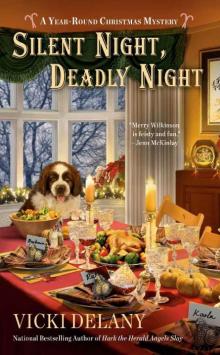 Silent Night, Deadly Night
Silent Night, Deadly Night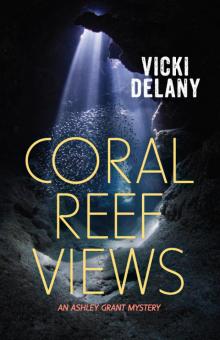 Coral Reef Views
Coral Reef Views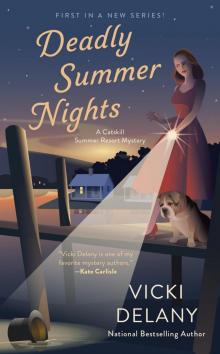 Deadly Summer Nights
Deadly Summer Nights Murder in a Teacup
Murder in a Teacup Whiteout
Whiteout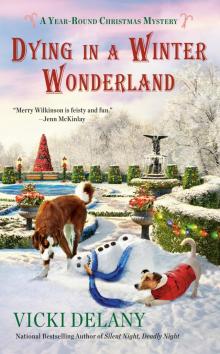 Dying in a Winter Wonderland
Dying in a Winter Wonderland Tea & Treachery
Tea & Treachery Rest Ye Murdered Gentlemen
Rest Ye Murdered Gentlemen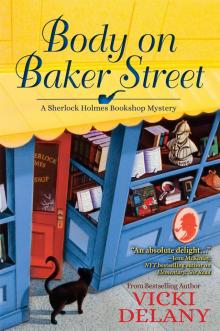 Body on Baker Street: A Sherlock Holmes Bookshop Mystery
Body on Baker Street: A Sherlock Holmes Bookshop Mystery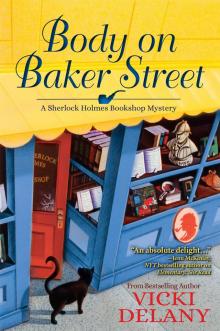 Body on Baker Street
Body on Baker Street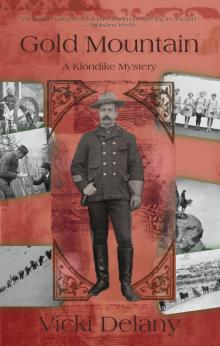 Gold Mountain
Gold Mountain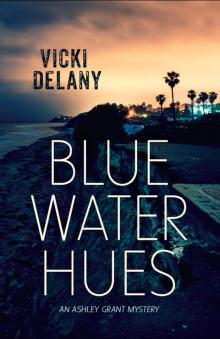 Blue Water Hues
Blue Water Hues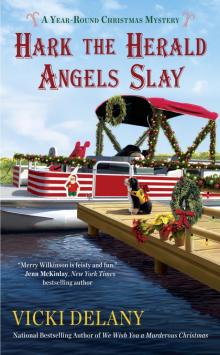 Hark the Herald Angels Slay
Hark the Herald Angels Slay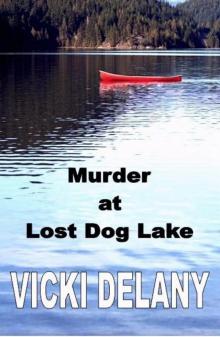 Murder at Lost Dog Lake
Murder at Lost Dog Lake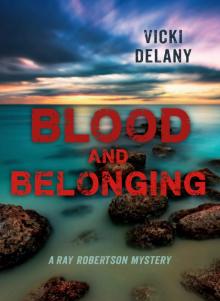 Blood and Belonging
Blood and Belonging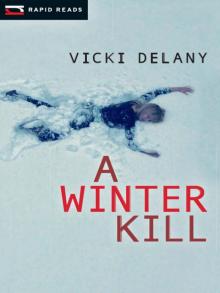 A Winter Kill
A Winter Kill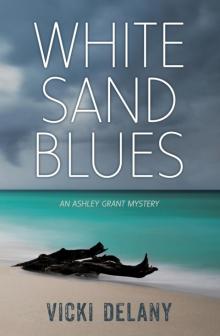 White Sand Blues
White Sand Blues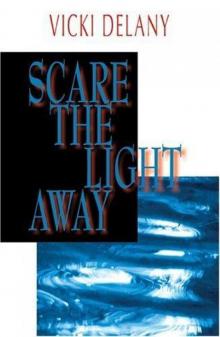 Scare the Light Away
Scare the Light Away Burden of Memory
Burden of Memory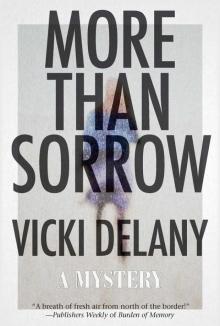 More Than Sorrow
More Than Sorrow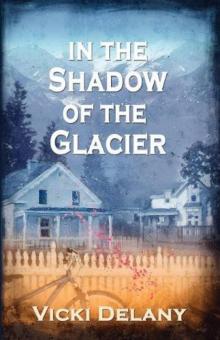 In the Shadow of the Glacier
In the Shadow of the Glacier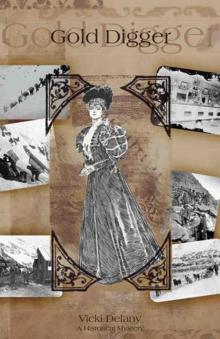 Gold Digger: A Klondike Mystery
Gold Digger: A Klondike Mystery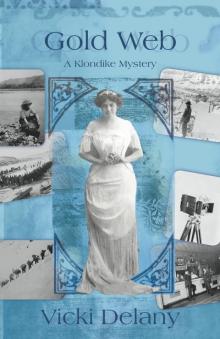 Gold Web
Gold Web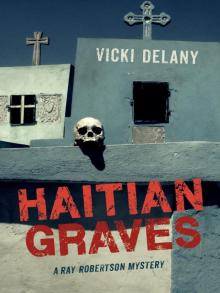 Haitian Graves
Haitian Graves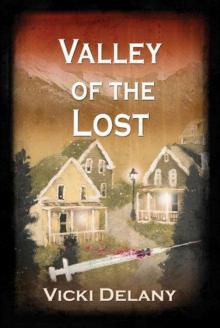 Valley of the Lost
Valley of the Lost We Wish You a Murderous Christmas
We Wish You a Murderous Christmas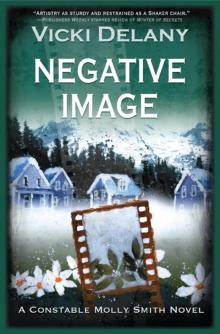 Negative Image
Negative Image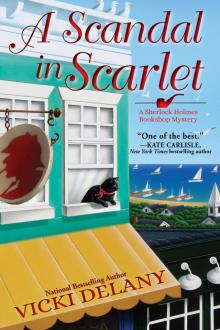 A Scandal in Scarlet
A Scandal in Scarlet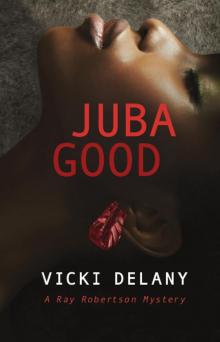 Juba Good
Juba Good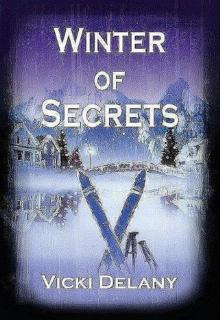 Winter of Secrets
Winter of Secrets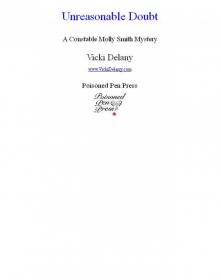 Unreasonable Doubt
Unreasonable Doubt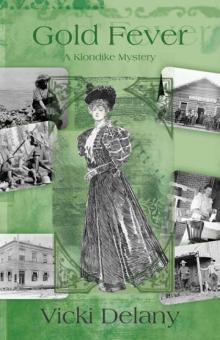 Gold Fever
Gold Fever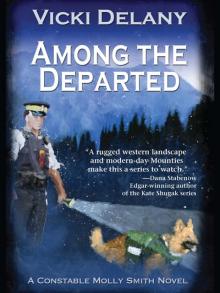 Among the Departed
Among the Departed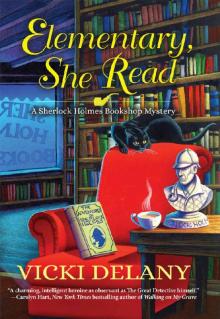 Elementary, She Read: A Sherlock Holmes Bookshop Mystery
Elementary, She Read: A Sherlock Holmes Bookshop Mystery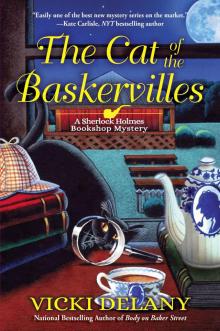 The Cat of the Baskervilles
The Cat of the Baskervilles